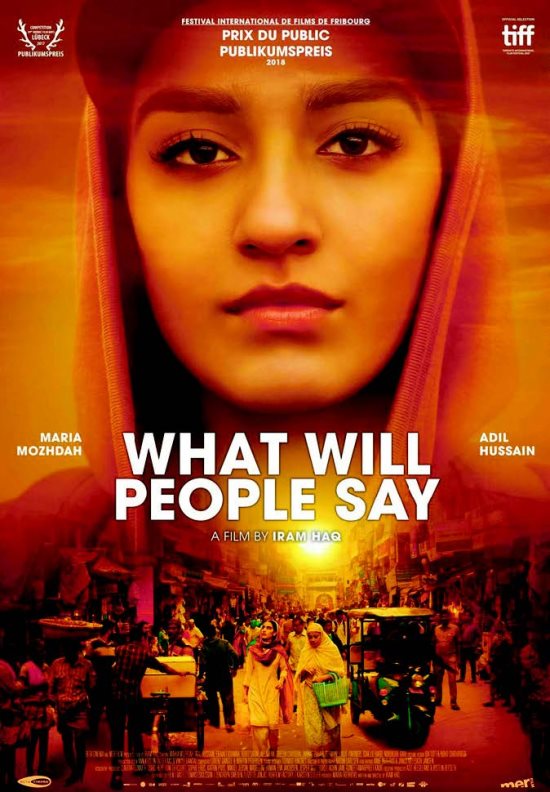| | Published February 6th, 2019
| 'What Will People Say' - a film that resonates close to home
| | | By Sophie Braccini |  | | The second movie by Norwegian director of Iraqi origin, Iram Haq, "What Will People Say" ("Hva vil folk si") is a suspenseful drama, sometimes difficult to digest, that shows how social pressure and traditional thinking of the Pakistani community living in Norway can push people to terrible extremes, such as kidnapping or forced marriage. It is also Haq's autobiography, told through Nisha, the heroine of the film who tells her own story and how she lived the same ordeal when she was 14 years old. Nisha (Maria Mozhdah) lives a split life with her traditional family on one side - exemplified by the all-powerful figure of her father - and her Norwegian friends on the other side. There is no understanding between both lives, no possible compromise. Haq shows the prejudices of this ordinary Pakistani family that does not accept the "white's" way of life; these degenerate people who they believe will end up alone and dishonored. Nisha lives by the laws of a country she had never seen, while being well integrated into the Norwegian society yet acutely aware of its conflicts with her family values. More than the mandatory virginity for girls before marriage, what is of primal importanc |
The second movie by Norwegian director of Iraqi origin, Iram Haq, "What Will People Say" ("Hva vil folk si") is a suspenseful drama, sometimes difficult to digest, that shows how social pressure and traditional thinking of the Pakistani community living in Norway can push people to terrible extremes, such as kidnapping or forced marriage. It is also Haq's autobiography, told through Nisha, the heroine of the film who tells her own story and how she lived the same ordeal when she was 14 years old.
 Nisha (Maria Mozhdah) lives a split life with her traditional family on one side - exemplified by the all-powerful figure of her father - and her Norwegian friends on the other side. There is no understanding between both lives, no possible compromise. Haq shows the prejudices of this ordinary Pakistani family that does not accept the "white's" way of life; these degenerate people who they believe will end up alone and dishonored. Nisha lives by the laws of a country she had never seen, while being well integrated into the Norwegian society yet acutely aware of its conflicts with her family values. More than the mandatory virginity for girls before marriage, what is of primal importance in this microcosm is one's reputation. So when Nisha sneaks a boyfriend into her room, the catastrophe unfolds.
Nisha (Maria Mozhdah) lives a split life with her traditional family on one side - exemplified by the all-powerful figure of her father - and her Norwegian friends on the other side. There is no understanding between both lives, no possible compromise. Haq shows the prejudices of this ordinary Pakistani family that does not accept the "white's" way of life; these degenerate people who they believe will end up alone and dishonored. Nisha lives by the laws of a country she had never seen, while being well integrated into the Norwegian society yet acutely aware of its conflicts with her family values. More than the mandatory virginity for girls before marriage, what is of primal importance in this microcosm is one's reputation. So when Nisha sneaks a boyfriend into her room, the catastrophe unfolds.
 Haq shows with precision the slow downward spiral of a young girl who has done nothing wrong. As Nisha is thrown into situations she cannot evade, Haq draws a portrait of Afghanistan where the rights of women are definitely not the first priority. She nonetheless shows that love and beauty can be found even in the worst situations.
Haq shows with precision the slow downward spiral of a young girl who has done nothing wrong. As Nisha is thrown into situations she cannot evade, Haq draws a portrait of Afghanistan where the rights of women are definitely not the first priority. She nonetheless shows that love and beauty can be found even in the worst situations.
 In an interview given during the Toronto International Film Festival where the movie was presented, Haq explained that her main point is that it is important for people to be allowed to live free of social pressures. She said that she would like families to see the film together so that both teens and parents can have a better understanding of what each are going through.
In an interview given during the Toronto International Film Festival where the movie was presented, Haq explained that her main point is that it is important for people to be allowed to live free of social pressures. She said that she would like families to see the film together so that both teens and parents can have a better understanding of what each are going through.
 This is certainly the most thought provoking aspect of the movie: to understand that all the bad treatment inflicted on Nisha by her family, and her own father, are perpetrated for her own good. Everyone is certain that what they are doing is done to give Nisha the best future possible. The love-hate relationship between the father and daughter is filmed beautifully by Haq through Nisha's eyes. How can she love a father who does to her what the story tells? The power of the film resides in the moral ambiguity of the relationship between a father and daughter who love each other, but whose conception of the world differs radically.
This is certainly the most thought provoking aspect of the movie: to understand that all the bad treatment inflicted on Nisha by her family, and her own father, are perpetrated for her own good. Everyone is certain that what they are doing is done to give Nisha the best future possible. The love-hate relationship between the father and daughter is filmed beautifully by Haq through Nisha's eyes. How can she love a father who does to her what the story tells? The power of the film resides in the moral ambiguity of the relationship between a father and daughter who love each other, but whose conception of the world differs radically.
 Haq, now 42 years old, said that it took her years before she was able to write the film, before the angry teenager had given way to a wiser person who also understood the pressure on her parents. She added that she was able to talk about the movie with her own father before he died, and that he apologized and encouraged her to complete her project.
Haq, now 42 years old, said that it took her years before she was able to write the film, before the angry teenager had given way to a wiser person who also understood the pressure on her parents. She added that she was able to talk about the movie with her own father before he died, and that he apologized and encouraged her to complete her project.
 "Nothing needs to stand still," Haq observed. "Things can change."
"Nothing needs to stand still," Haq observed. "Things can change."
 "What Will People Say" will open at the Orinda Theatre on Feb. 8 for one week, followed by a week at the Rheem Theatre as part of the International Film Showcase, which brings to Lamorinda notable international films recognized in festivals around the world and not yet released in the Bay Area.
"What Will People Say" will open at the Orinda Theatre on Feb. 8 for one week, followed by a week at the Rheem Theatre as part of the International Film Showcase, which brings to Lamorinda notable international films recognized in festivals around the world and not yet released in the Bay Area. |
| | | | | | | | | | | | |



